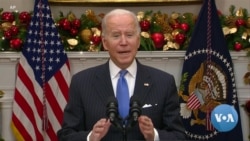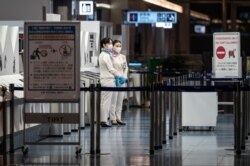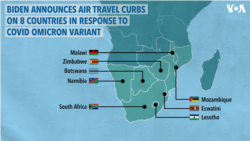The new omicron variant of the coronavirus, first identified in South Africa, is spreading to more countries, leading the World Health Organization to warn of perils ahead and sparking some countries to widen their calls for booster shots.
Spain became the latest country Monday to detect the new variant after Portugal said it had detected 13 cases, all involving players and staff of top division soccer club Belenenses SAD, one of whom recently returned from South Africa.
Other countries that have confirmed cases of the omicron variant include Canada, Scotland, Australia, the Netherlands, Austria and Sweden.
WHO Director-General Tedros Adhanom Ghebreyesus told a special session of the World Health Assembly in Geneva, "This pestilence – one that we can prevent, detect and treat – continues to cast a long shadow over the world."
Omicron’s very emergence is another reminder that although many of us might think we are done with COVID-19, it is not done with us," Tedros said Monday. "We are living through a cycle of panic and neglect. Hard-won gains could vanish in an instant. Our most immediate task, therefore, is to end this pandemic."
The WHO said the overall global risk related to the omicron variant "is assessed as very high" although no deaths have been linked to it.
The threat of the variant prompted both the United States and Britain to recommend Monday that all adults get COVID-19 booster shots.
In the United States, the Centers for Disease Control and Prevention had previously approved booster shots for all adults but only recommended them for those age 50 and older or those who were at high risk for the disease.
Britain’s government expanded booster eligibility to people between ages 18 and 39 after previously offering it only to those over 40 or at high risk for the disease.
Omicron prompts travel bans
Poland and Japan became the latest countries Monday to announce travel bans because of the virus. Poland said it was suspending flights to seven southern African countries while Japan said it would suspend entry of all foreign visitors beginning Tuesday.
Israel and Morocco have also closed their borders to all foreign visitors. Other countries, including the United States, Canada, Brazil and some European Union nations, have barred or limited travelers from Africa’s southern region.
U.N. Secretary-General Antonio Guterres said he was "deeply concerned about the isolation of southern African countries" due to the travel restrictions.
In a statement Monday, he pointed to low vaccination rates as the main problem and said, "The people of Africa cannot be blamed for the immorally low level of vaccinations available in Africa – and they should not be penalized for identifying and sharing crucial science and health information with the world."
South African President Cyril Ramaphosa said his country is "deeply disappointed" by the travel bans. "These restrictions are completely unjustified and unfairly discriminate against our country and our southern African sister countries," the South African leader said in a televised address Sunday.
"The prohibition of travel is not informed by science, nor will it be effective in preventing the spread of this variant. The only thing the prohibition on travel will do is to further damage the economies of the affected countries and undermine their ability to respond to and also to recover from the pandemic," he said.
The World Health Organization has called for caution as countries have quickly moved to close their borders.
"It is not yet clear whether omicron is more transmissible ... compared to other variants, including delta," the WHO said Sunday in a statement. "The number of people testing positive has risen in areas of South Africa affected by this variant, but epidemiologic studies are underway to understand if it is because of omicron or other factors. ... There is currently no information to suggest that symptoms associated with omicron are different from those from other variants."
Dr. Unben Pillay, a South African general practitioner in the heavily hit Gauteng province, told the Associated Press that the sharp increase in new COVID-19 cases attributed to the omicron variant is resulting in mostly mild symptoms. He said that most people are being treated at home and that those who are vaccinated are faring better than those who are not.
In the United States, top U.S. epidemiologist Anthony Fauci told ABC's Good Morning America on Monday, "Obviously, we're on high alert."
"It's inevitable that, sooner or later, it's going to spread widely," he said.
Margaret Besheer contributed to this story from New York. Some information in this report came from Reuters and the Associated Press.









